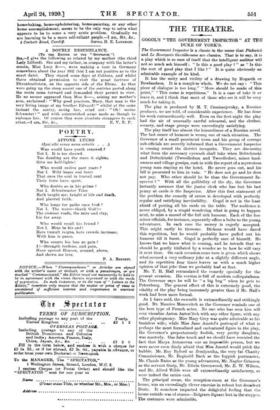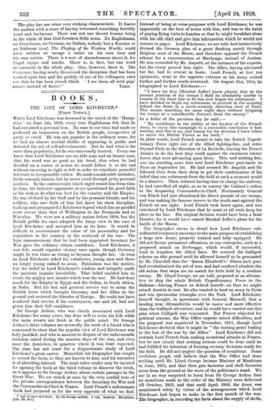THE THEATRE.
GOGOL'S " THE GOVERNMENT INSPECTOR " AT THH DUKE OF YORK'S.
The Government Inspector is a classic is the sense that Pia:with and Le Bourgeois Gentilhomme are classics. That is to say, it is a play which is so sure of itself that the intelligent auditor will not so much ask himself : " Is this a good play ? " as " Is this the sort of good play that I like ? " It is quite obviously an admirable example of its kind.
It has the unity and virility of a drawing by Hogarth or Rowlandson. It is a complete whole. We do not say : " This piece of dialogue is too long," " More should be made of this point," " This scene is repetitious." It is a case of take it or leave it, and I think that most of those who see it will be very much for taking it. -
The play is produced by M. T. Comisarjevsky, a Russian producer, we are told, of considerable experience. He has done his work extraordinarily well. Even on the first night the play had the air of unusually careful rehearsal, and the clothes, scenery, and stage groups were exceedingly satisfying.
The play itself has almost the leisureliness of a Russian novel. The last ounce of humour is wrung out of each situation. The Governor of a small provincial town and his group of corrupt sub-officials are secretly informed that a Government Inspector is coming round the district incognito. They are discussing what form the necessary eyewash shall take when Bobtchinski and Dobtchinski (Tweedledum and Tweedledee), minor land- owners and village gossips, rush in with the report of a mysterious young man staying at the hotel. He never goes out, and his bill is presented to him in vain. " He does not go and he does not pay. Who other should he be than the Government In- spector ? " With all the gullibility of the sly, the Governor Instantly assumes that the junior clerk who has lost his last penny at cards is the Inspector. After this first statement of the problem the comedy of errors is developed with perfectly regular and satisfying inevitability. Gogol is not in the least afraid of putting all his cards on the table. The audience is never obliged, by a stupid wondering what is going to happen next, to miss a morsel of the full rich humour. Each of the five minor officials, for instance, separately offers a bribe to the young adventurer. In each case the money is eagerly accepted. This might easily be tiresome. Dickens would have dared this repetition, but he would probably have puffed out his humour till it burst. Gogol is perfectly sure of himself. He knows that we know what is coming, and he intends that we should be gently titillated by a wonder as to how he will vary it next time. On each occasion some turn is given which shows what seemed a very ordinary joke at a slightly different angle, and its repetition four times leaves us with a much higher opinion of that joke than we probably had at first.
Mr. T. H. Hall retranslated the comedy specially for the present occasion. His version is full of modern colloquialisms. The Governor says he will be " a big bug " when he gets to Petersburg. The general effect of this is extremely good, the vitality of the play being immensely greater than if Mr. Hall's work had been more formal.
As I have said, the ensemble is extraordinarily and strikingly good. Mr. Maurice Moscovitch as the Governer reminds one of the best type of French actor. No one who has seen him will ever visualize Anton Anton itch with any other figure, with any other physiognomy. Miss Mary Grey was quite admirable as his brainless wife; while Miss Jane Amstefs portrayal of what is perhaps the most formalized and caricatured figure in the play, the Governor's preposterously foolish, very pretty daughter, was masterly. One false touch and we should have resented the fact that Marys Antonovna was an impossible person, but we were never even dimly afraid that Miss Amstel would prick the bubble. Mr. Roy Byford as Zemlyanika, the very fat Charity Commissioner, Mr. Reginald Bach as the foppish postmaster, Mr. Claude Rains as the young adventurer, Mr. Naylor Grimson as the servant Ossip, Mr. Edwin Greenwood, Mr. R. W. Wilson, and Mr. Alfred Wilde were all extraordinarily satisfactory, as were indeed the entire cast.
The principal scene, the reception-room at the Governor's house, was an exceedingly clever exercise in robust but decadent Doric. It somehow imparted the delightful feeling that the house outside was of stucco--Belgrave Square lost in the steppes. The costumes were admirable. The play has one other very striking characteristic. It leaves the auditor with a sense of having witnessed something horribly cruel and barbarous. There was not one decent human being in the whole of that God-forsaken little town. No Englishman, no Frenchman, no German, no Italian, nobody but a Russian or an Irishman (conf. The Playboy of the Western World), could have written so savage a satire on his own time and his own nation. There is a sort of shamelessness about it, for Gogol enjoys and mocks. There is, in fact, but one word of comment in the whole play. One, however, there is. The Governor, having newly discovered the deception that has been worked upon him and the perfidy of one of his colleagues, cries out that he has been struck blind. " I see them all with pigs'



































 Previous page
Previous page